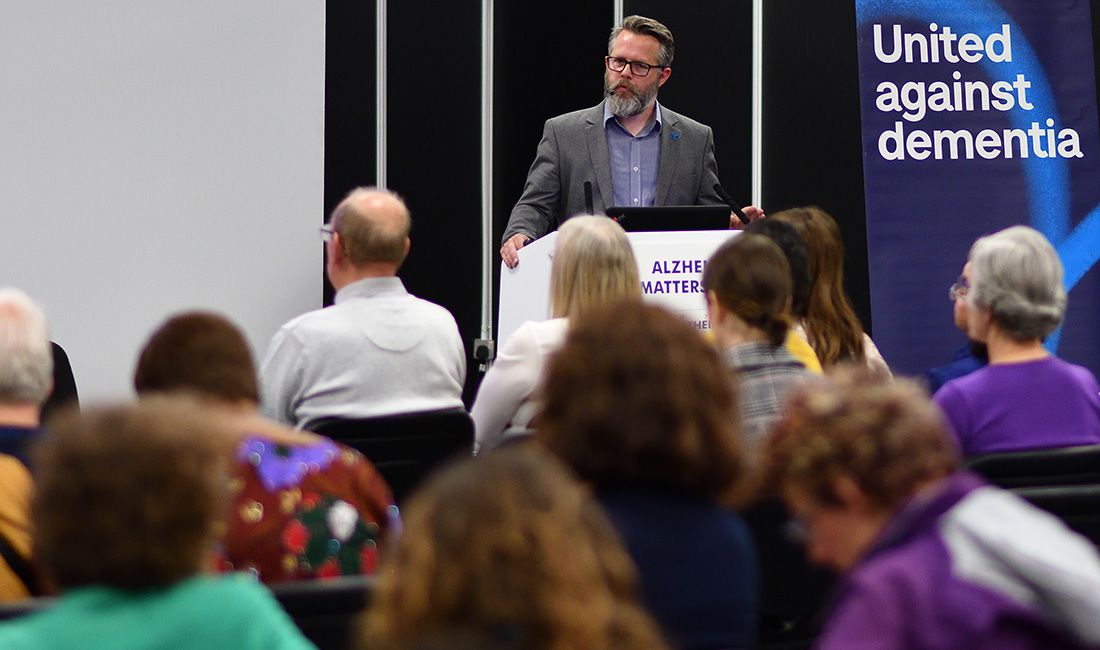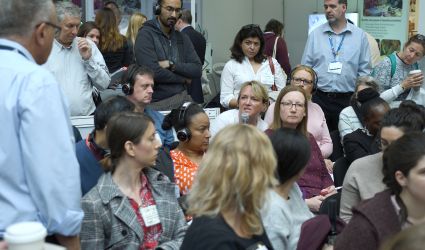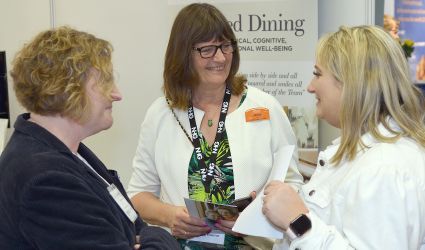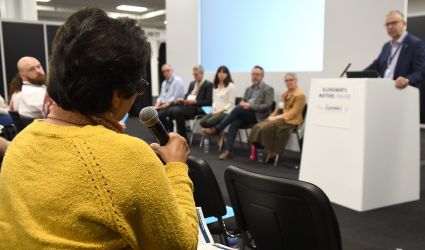
Speaker Programme
Expert speakers at The Alzheimer’s & Dementia Show
Dementia Matters Theatre
Friday 14th June
10.10 - 10.15 - A welcome and introduction to this year's Alzheimer's & Dementia Show. - Alzheimer’s Society
10.15 - 10.40 - Alzheimer’s Society
10.45 - 11.15 - Introducing our new Dementia strategy - What does good dementia care look like? Current picture of dementia care
An introduction to our dementia strategy. Understanding how we can use our role to improve the experience of people living with dementia and their families, in health and social care services. How can you get involved?
Amanda Partington-Todd, Deputy Director of Adult Social Care, Care Quality Commission
11.20 - 11.45 - Steady Progress - Professor Martin Green OBE, Chief Executive, Care England
11.50 - 12.15 - Enhancing Dementia Care Through Therapeutic Seating Solutions.
Kirsty O’Connor, Occupational Therapist and Clinical Training Manager at Seating Matters
12.20 - 12.45 - Rarer dementias. An overview of several different forms of rare dementia.
• Familial and young onset Alzheimer’s disease
• Posterior cortical atrophy
• Frontotemporal dementia and primary progressive aphasia
• Lewy body dementia
• Support and care for people with a rare dementia
Sebastian Crutch, Neuropsychologist at University College London
12.50 - 13.35 - QUESTION TIME. Put your questions to a panel of experts on topics relating to dementia and care.
Moderator: Alzheimer’s Society
13.40 - 14.05 - Social Integration.
As humans we are designed to be social creatures, research has shown that being social is not only good for our physical wellbeing, but also our cognitive processes! In this bite size presentation, founder of Sunday Care Therapy & OT Derek Sleater will talk about the importance of getting social integration right! From what the research is saying to practical tips we actively use on a daily basis while working with our clients. This is the talk not to be missed!
Derek Sleater, Co-Founder Sunday Care Therapy and Occupational Therapist
14.10 - 14.35 - Supporting Families Affected by Frailty.
The session aims to offer a brief introduction to frailty and Acute frailty syndromes:
• What they are
• Vulnerability, risk factors, symptoms, and indicators
• The importance of identification, diagnosis, management, and monitoring
• Alongside a role discussion (Dementia UK Consultant Admiral Nurse for frailty)
Kerry Lyons, Consultant Admiral Nurse for Frailty
Dementia UK
14.40 - 15.05 - Talking with Dementia Reconsidered : an inside view.
Taking the Kitwood flower model and using it to enable people with dementia to speak about their lives today.
Keith Oliver, living with Alzhiemer's, co-author and co-editor of Dementia Reconsidered book series (Open University Press)
15.10 - 15.40 - Accessibility, digital transformation and dementia.
How we can leverage digitial transformation and new technology to improve the experience of those living with dementia - interactive session.
Niki-Evans Ward, Service Design Lead, Alzheimer's Society
15.45 - 16.10 - Artificial Intelligence and Dementia: Current and Future Applications.
This session will explain what artificial intelligence (AI) is, how it works and gives examples of AI in everyday life and health care. We will discuss how AI can help and what the future may look like and highlight the challenges and opportunities of using AI for dementia research and care.
Vic Lyons, Senior Consultant Admiral Nurse, Dementia UK
16.15 - 16.40 - The future of dementia care.
The more we understand dementia, the better the future of dementia care will be delivered. During this session, we will discuss the importance of education from an early age through to a professional career as a caregiver. Delving into the current training available we will seek to ask the question, is it suitable or do we need to think differently to ensure that the care we deliver is truly person-centred.
Paul Blane, Managing Director, Care Business Associate Training
Saturday 15th June
10.20 - 10.25 - A welcome and introduction to this year's Alzheimer's & Dementia Show.
Paul Edwards, Director of Clinical Services, Dementia UK
10.25 - 10.55 - NHS Continuing Healthcare - Navigating the system.
Here we explain the criteria for Continuing Healthcare Funding (CHC). This session covers: What is CHC? The application process including initial checklist. The decision support tool. How families can prepare for the assessment.
Amy Purton, Admiral Nurse, Core Clinical Services , Dementia UK
11.00 - 11.25 - The Role of Smart Home Technology in a future of Digitally Enabled Care.
As society considers a future with AI, increasing emphasis is placed on the role of emerging technologies in dementia care. The UKDRI - Care Research & Technology centre share their vision and progress towards the use of smart homes in the context of new service models for digitally enabled health and social care.
Sarah Daniels, Occupational Therapist – Health and Social Care Translation and Danielle Wilson, Centre and Commercialisation Manager, UK Dementia Research Institute, Care Research & Technology Centre
11.30 - 11.55 - Exploring the relationships between Caregivers and those for whom they care.
A diagnosis of dementia changes everything. How can we ease the burden on our carers?
Peter Middleton. Expert by experience
12.00 - 12.30 - Innovative Seating: Transforming Dementia Care Environments for Improved Quality of Life.
Kirsty O’Connor, Occupational Therapist and Clinical Training Manager at Seating Matters
12.35 - 13.20 - QUESTION TIME. Put your questions to a panel of experts on topics relating to dementia and care.
Panel: Paul Edwards, Director of Clinical Services, Dementia UK. Peter Middleton, Expert by Experience. Beth Britton, freelance campaigner and former carer.
Chair: Helen Green, Deputy Clinical Lead Admiral Nurse, Dementia UK
13.30 - 14.00 - Why is this happening? (behaviour, communication; advice on how to manage).
This session looks at changes in behaviour as dementia progresses, possible reasons for this focusing on underlying emotions and thought processes/beliefs. Also looking at the impact changes in cognitive functioning can have and finally advice on approaches that carers can take to manage some changes in behaviour that may present as a challenge.
Helen Green, Deputy Clinical Lead Admiral Nurse and Daniel Starck, Deputy Clinical Lead Admiral Nurse, Dementia UK
14.05 - 14.30 - 'Issues with eating and drinking?
One of the most important aspects of dementia to get right is eating and drinking, no other aspect of dementia can have such an immediate impact as when eating or drinking goes wrong! Sunday Care Therapy’s founder & OT Derek Sleater will talk about the importance of understanding the hows and whys when it comes to eating and drinking. Learn how to take something that is stressful and turn it into something fun!
Derek Sleater, Co-Founder Sunday Care Therapy and Occupational Therapist
14.35 - 15.00 - Involvement for Impact - How Alzheimer's Society uses lived experience to improve outcomes for people with dementia.
Involvement Lead, Alzheimer's Society
Talks & Activities Hub
Friday 14th June
10.00 - 10.40 - ACTIVITY. Activities for individuals living with dementia.
This workshop will look at how to engage people living with dementia in person centred activity and engagement.
Hilary Woodhead, NAPA Executive Director and Sue Trischitta, Head of Professional Development, NAPA
10.45 - 11.25 - ACTIVITY. The Dementia Power Hour.
Transform or deepen your understanding of dementia. By improving awareness; by learning the ‘3 P’s’ that everyone living with dementia needs; by thinking ‘what colour is their traffic light’ and ‘am I a detective or an interrogator’: caring becomes more effective.
Nikki Shepherd, Lead Health & Wellbeing Specialist Dementia Coach & Educator, Havant and Waterlooville PCN
11.30 - 11.55 - Recognising and Preparing for End of Life with Dementia'.
This session will look at palliation versus end of life; how to plan for the future; recognising end stages of dementia and resources to help you plan.
Sheridan Coker, Deputy Clinical Lead Admiral Nurse and Mandy Cheyne, Admiral Nurse, Core Clinical Services, Dementia UK
12.00 - 12.20 - Working together for access and inclusion in dementia.
Dementia Adventure
12.25 - 12.45 - Using motion-activated technology to promote wellbeing.
Trevor Nell, Director of Operations, OM Interactive
12.50 - 13.15 - Help and hope to people living with dementia through product and service innovations.
TBC - The Alzheimer's Society Accelerator Programme and upcoming innovations.
Alzheimer's Society
13.20 - 13.40 - Introducing the Dementia Dictionary.
The world’s very first, completely free to use resource, dedicated to helping people around the world learn the language of dementia by helping to explain why people living with dementia may be doing the things they do. This session will give you a guided tour of the dictionary and explains how it may help you.
Michael Peachey, Associate Director, Training 2 Care
13.45 - 14.10 - Anatomy of a primary care dementia service.
Primary care dementia service meeting the long term needs of patients and their families. Can primary care be the central provider of practical and emotional support through liaison, signposting, psychological support and education?
Rikki Lorenti, Lead Admiral Nurse, Dementia Support Team, Havant and Waterlooville PCN
14.15 - 14.55 - ACTIVITY. Empowering Independence: A Teepa Snow Workshop on Hand Under Hand Approach.
Discover Teepa Snow's 'Hand under Hand' approach to promote independence and enhance the lives of those you care for.
Kate Thubron, Lead Trainer and Consultant, Mindful Care Training and Consultancy
15.00 - 15.20 - Securing External Medications: Practical Strategies for Care Homes.
Join us to explore securing external medications in care homes, improving accessibility and efficiency while meeting the Care Quality Commission's standards. Discover Lockabox®, a discreet solution, aligned with CQC guidelines. Proudly part of the Made In Britain Campaign, offering cost-effective medical-grade solutions.
Peter Morris, Founder & CEO, Lockabox
15.25 - 15.45 - Dementia Prevention through Lifestyle Medicine.
This talk is about dementia risk factors and how to reduce them through multidomain lifestyle interventions.
Dr Liana Borza, Founder of Prevention Journeys Ltd
15.50 - 16.15 - Empathetic Connections: Revolutionising Dementia Care through Co-Produced Technology Solutions.
SweetTree Home Care Services and SweetTree Connect present how connective apps can be harnessed to foster collaborative excellence by integrating individual assessments, personalised care plans, and innovative monitoring systems, ensuring a truly person-centred and empowering experience.
Matthew Mills, Operations Director & Registered Manager, SweetTree Home Care Services
16.20 - 16.45 - Dementia and the Law. How individuals and families can use regulatory law to empower decision making.
Nicole Ridgewell, Senior Associate, Lester Aldridge Solicitors
Saturday 15th June
10.15 - 10.55 - ACTIVITY. Working All Hours – A Reminiscence Workshop.
Demonstrating our third in a series of reminiscence books inspired by and designed for younger people with dementia. We will take you on a trip back to the 60's & 70's, showing you how to use and get the best of the book and discuss memories of your workplace and of others. Whether you worked as a policeman, a teacher, a housewife or a secretary, ‘Working All Hours’ is sure to conjure up a lot of memories and a great tool in aiding discussion, conversation and of course reminiscence.
Dr Jacqueline Hussey, Old Age Consultant Psychiatrist and Caroline Blanchette, Joint Director of Clinical & Operational Services, YPWD
11.00 - 11.25 - A collaborative approach to supporting children and young people with a parent living with young onset dementia.
Sharing innovative and collaborative practice, vision, learning points and motivation through providing a rounded overview of how children and young people living with a parent with young onset dementia have been supported within the Berkshire area with the opportunity for a q & a at the end.
Phillippa Heath, Learning and Engagement Manager from Museum of English Rural Life. Professor Arlene Astell, Visiting Professor, School of Psychology & Clinical Language Sciences, University of Reading
Professor in Psychology, Department of Psychology, Northumbria University. Lizzie Harrison, Admiral Nurse. Charlie Draper, Joint Director of Clinical & Operational Services. Hannah Riches, Carer.
11.30 - 11.55 - Alzheimer's Society
12.00 - 12.20 - We need to talk about care - breaking the taboo.
Talking about care doesn't need to be difficult. Planning ahead, knowing your options and discussing your preferences can lead to a life-enhancing experience. Here we offer guidance for those considering in-home care.
Fred Lloyd George, Managing Director, Hamilton George Care
12.30 - 13.10 - ACITIVITY. Understanding brain changes in dementia care - a Teepa Snow approach.
An interactive session exploring the brain and these changes in Dementia. Understanding the reasons behind challenges and discover effective strategies to provide meaningful support.
Kate Thubron, Lead Trainer and Consultant, Mindful Care Training and Consultancy
13.30 - 13.55 - Navigating the world of dementia when you are living with a learning disability.
MacIntyre’s health team shares their knowledge and experiences of supporting a person to live with a diagnosis of dementia and a learning disability with a person-centred approach, with the voice of lived experience throughout.
Nicola Payne, Rosie Joustra and Meg Wilding, Best Practice Health Team MacIntyre
14.00 - 14.25 - What I wish I’d known when my dad was alive.
Join Beth for a whistle-stop tour of everything she wished she’d known during her dad’s 19 years with dementia. This interactive session will include good practice advice and signposting gained from Beth’s 12+ years working in health and social care.
Beth Britton, Freelance Campaigner, Consultant, Writer and Blogger. Former Carer
14.30 - 14.55 - The use of Dolls in Dementia Care.
This workshop will look at the effectiveness and ethical considerations of using dolls in activity provision for individuals in care settings.
Hilary Woodhead, NAPA Executive Director
15.00 - 15.25 - Ageing in Caribbean Communities.
Rianna will share non-pharmaceutical approaches to dementia care in the Caribbean. This session aims to build the cultural perspective and treatments of dementia explored in Caribbean communities
Rianna Patterson, Founder of the Dominica Dementia Foundation




)
)
)
)
)
)
)
)